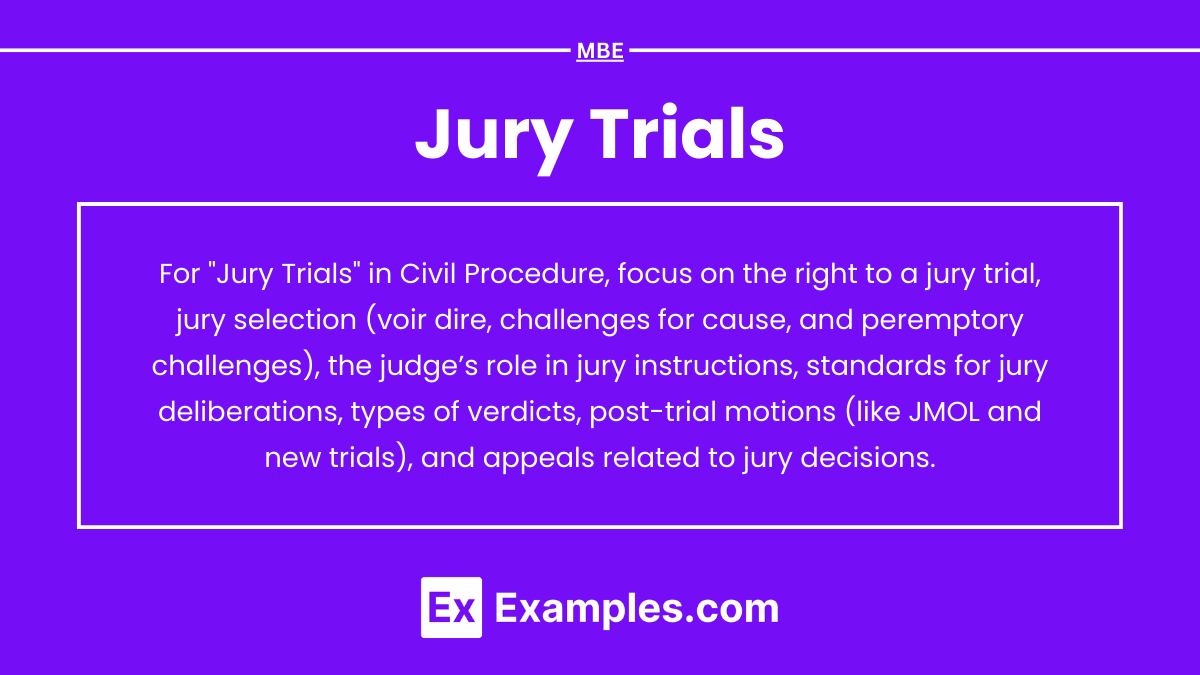Jury trials are a fundamental component of the American legal system, allowing citizens to participate in the administration of justice. In civil cases, parties may have a right to a jury trial depending on the type of claim, where jurors play a crucial role in determining factual disputes and reaching a fair verdict. The process involves jury selection, voir dire, presentation of evidence, and deliberation. Judges guide jurors through instructions on applicable laws, ensuring their verdict aligns with legal standards while upholding fairness and impartiality.
Learning Objectives
In studying “Civil Procedure: Jury Trials” for the MBE Exam, you should learn to understand the legal framework governing jury trials in civil cases, including the right to a jury trial under the 7th Amendment, the distinction between legal and equitable claims, and the selection process, including voir dire, challenges for cause, and peremptory challenges. Analyze the formulation and delivery of jury instructions, emphasizing the need for clarity and accuracy in reflecting applicable law. Evaluate post-trial motions like Judgment as a Matter of Law (JMOL) and the standards for granting a new trial. Apply this knowledge to interpret fact patterns and procedural issues in practice questions.
Jury trials are an essential component of the U.S. civil judicial system, enshrined under the Seventh Amendment of the U.S. Constitution. This amendment guarantees the right to a jury trial in civil cases exceeding a certain monetary threshold in federal courts. Additionally, state constitutions or statutes provide similar rights for civil jury trials in state courts, with certain variations.
1. Right to a Jury Trial in Civil Cases
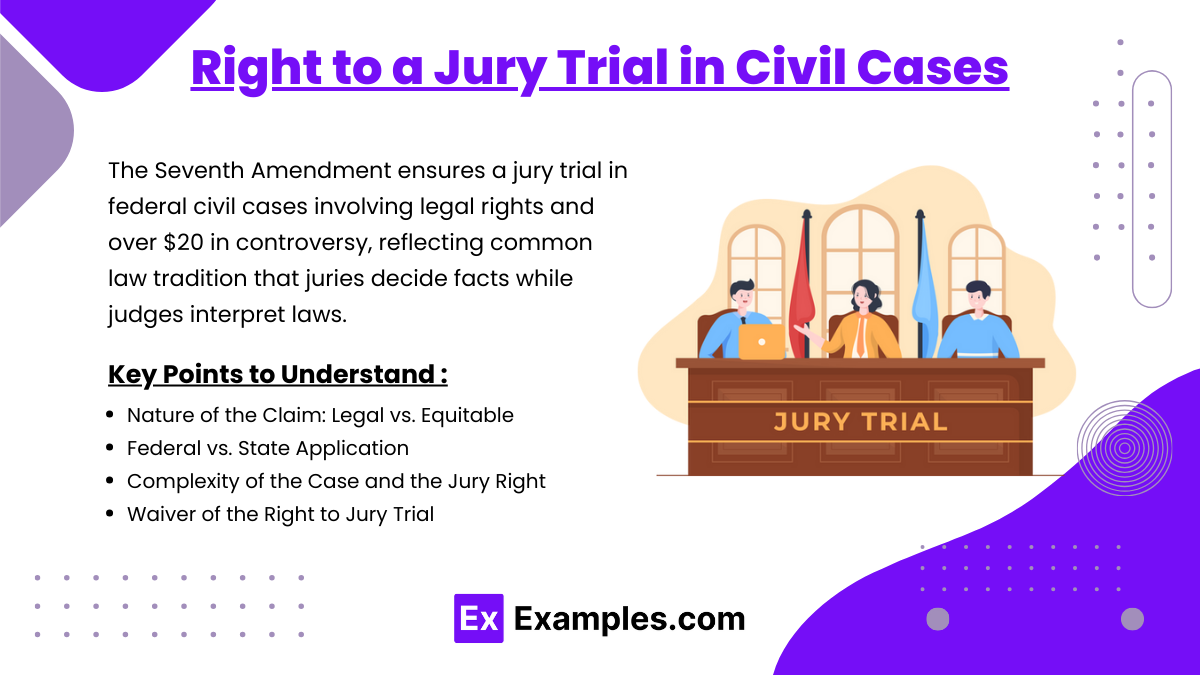
The right to a jury trial in civil cases is a constitutional protection under the Seventh Amendment in the United States, which guarantees that parties in federal courts are entitled to a jury trial in civil disputes when the claim involves legal rights, as opposed to equitable rights, and the amount in controversy exceeds $20. The Seventh Amendment reflects the historical common law principle that juries should determine matters of fact, leaving matters of law to be decided by judges. This right, however, only applies to federal courts, as the Seventh Amendment does not apply to state courts. The Seventh Amendment guarantees the right to a jury trial in federal civil cases “at common law” where the value in controversy exceeds twenty dollars. In the modern context, this right typically applies to legal claims (as opposed to equitable claims) in cases that resemble traditional common law actions.Many states have adopted similar provisions, though the specific requirements can vary.
Key Points to Understand:
- Nature of the Claim: Legal vs. Equitable
- In civil cases, a jury trial is available for cases involving “legal” claims, such as those seeking monetary damages, but it generally does not apply to “equitable” claims, which involve remedies like injunctions or specific performance.
- Courts assess whether the nature of the claim is legal or equitable by examining the type of relief sought and historical context. For example, contract disputes involving financial compensation would typically be eligible for a jury trial, whereas a case seeking an order to stop certain behavior (like a cease-and-desist order) might not.
- Federal vs. State Application
- The Seventh Amendment applies only to civil cases in federal courts. While many state constitutions have adopted similar guarantees, they are not required to do so under federal law.
- In federal courts, this right is fundamental and is preserved for cases where the amount in controversy exceeds $20. Although this amount is nominal, it reinforces the historical principle of jury trials in civil matters.
- Complexity of the Case and the Jury Right
- There are instances where a judge might decide that the issues in a case are too complex for a jury to understand, making a jury trial impractical. This is particularly rare and occurs mostly in cases involving complicated financial disputes or technical subject matter.
- In such cases, a judge may deny a jury trial to ensure fair adjudication based on an in-depth understanding of the legal and technical aspects of the case.
- Waiver of the Right to Jury Trial
- Parties may waive their right to a jury trial by mutual agreement or by failing to request it within a specified time.
- Federal Rule of Civil Procedure 38 outlines that the right to a jury trial can be waived if a party does not demand it in writing within 14 days after the last pleading directed to the issue is served.
2. Demand for Jury Trial
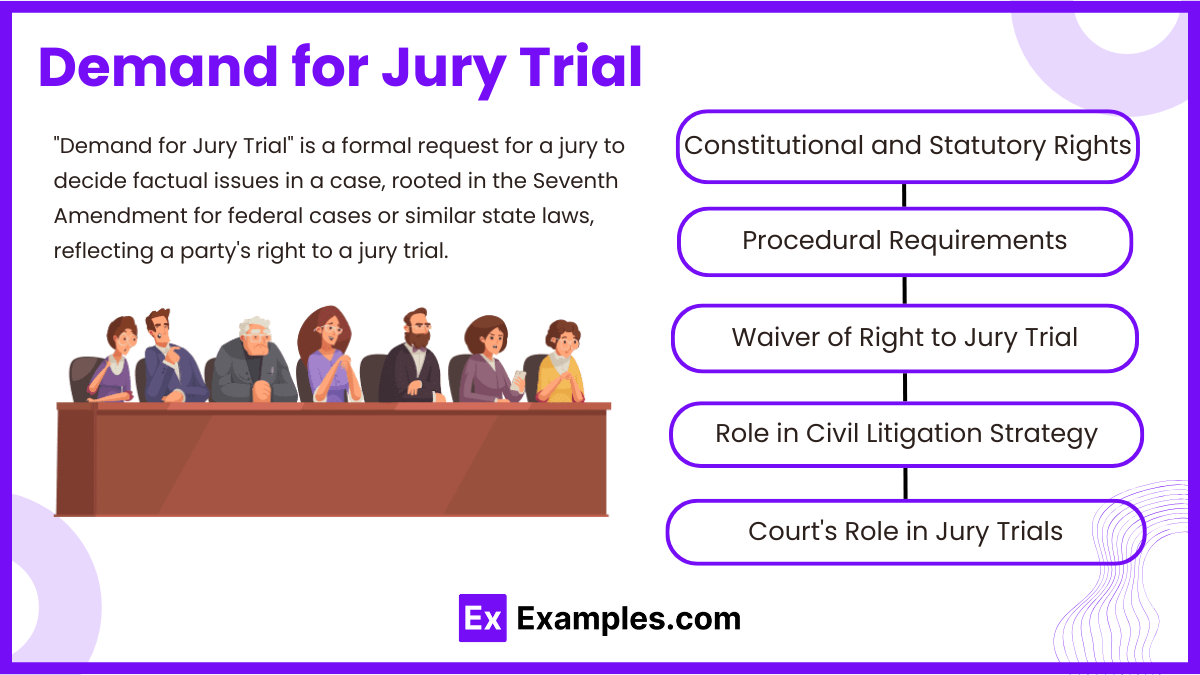
“Demand for Jury Trial” is a formal request by a party in a lawsuit to have the factual issues in the case decided by a jury rather than a judge. This demand is typically based on the party’s right to a jury trial as provided by the Seventh Amendment of the U.S. Constitution (applicable in federal cases) or under similar provisions in state constitutions and statutes. A party usually files a demand for a jury trial early in the proceedings, often with the initial pleadings, to ensure the right is preserved.
Key Aspects of a Demand for Jury Trial
- Constitutional and Statutory Rights
- In federal cases, the Seventh Amendment guarantees the right to a jury trial for civil cases involving “legal” (rather than “equitable”) claims when the amount in controversy exceeds $20. This amendment applies specifically to federal courts, but most states offer similar rights in their own courts.
- Claims that are legal in nature (such as those seeking monetary damages) usually qualify for a jury trial, whereas equitable claims (such as requests for injunctions) are typically decided by a judge.
- Procedural Requirements
- Filing a Demand: A party must file a written demand for a jury trial within a specified time frame, generally no later than 14 days after the last pleading directed to the issue is served (under the Federal Rules of Civil Procedure). Failure to make this demand on time can result in the waiver of the right to a jury.
- Specification of Issues: In some cases, the party may request a jury trial for specific issues within a case while allowing others to be decided by the judge. This is particularly relevant in complex cases with both legal and equitable claims.
- Waiver of Right to Jury Trial
- If a party fails to file a demand for a jury trial within the designated period, they typically waive their right to a jury, meaning the case will be heard solely by the judge. This waiver can be explicit (intentionally waived) or implicit (failure to meet procedural requirements).
- Once waived, the right to a jury trial generally cannot be reclaimed later in the litigation process without the court’s permission, which is rarely granted.
- Role in Civil Litigation Strategy
- Strategic Considerations: Deciding whether to demand a jury trial is often a strategic decision. In some cases, parties may prefer a jury due to the potential for a sympathetic response from laypeople, particularly in cases involving personal injury, discrimination, or other claims where emotional elements are persuasive. Conversely, parties might avoid a jury trial if they believe a judge’s legal expertise could lead to a more favorable decision.
- Impact on Case Complexity and Duration: Jury trials tend to be longer and more costly than bench trials, as they require additional steps, including jury selection, instructions, and deliberation time.
- Court’s Role in Jury Trials
- Once a jury trial is demanded and granted, the court oversees the process, ensuring jurors receive proper instructions on the law, addressing evidentiary issues, and ruling on procedural motions.
- The court also maintains control over certain aspects, such as determining legal issues that may arise during the trial. Although the jury decides on factual issues, the judge plays a critical role in guiding the proceedings and upholding fairness.
3. Composition and Selection of a Jury
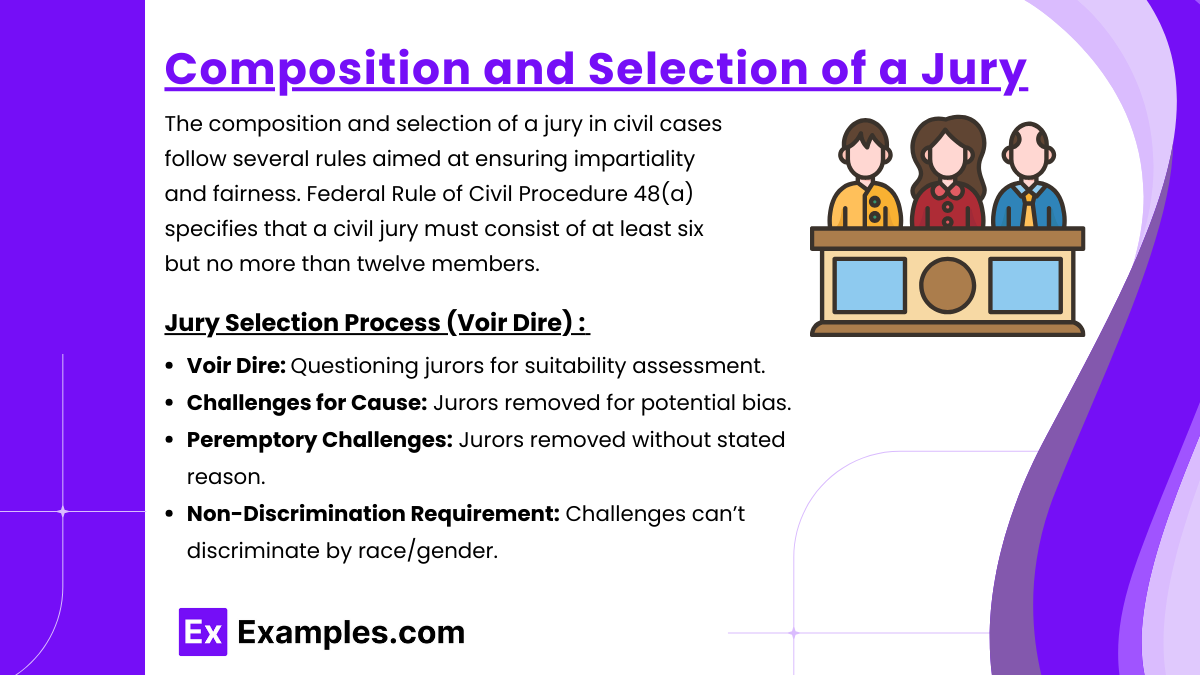
The composition and selection of a jury in civil cases follow several rules aimed at ensuring impartiality and fairness. Federal Rule of Civil Procedure 48(a) specifies that a civil jury must consist of at least six but no more than twelve members. All jurors must participate in deliberations, with the court having discretion in determining the exact number.
Jury Selection Process (Voir Dire):
- Voir Dire: This is the process where potential jurors are questioned to assess their suitability, and it includes challenges for cause and peremptory challenges.
- Challenges for Cause: Either party may challenge a juror “for cause” if there is a reason to believe the juror is biased or unqualified.
- Peremptory Challenges: These allow each side to remove a limited number of jurors without stating a reason, though they cannot be used in a discriminatory manner (e.g., on the basis of race or gender, per Batson v. Kentucky).
4. Jury Instructions
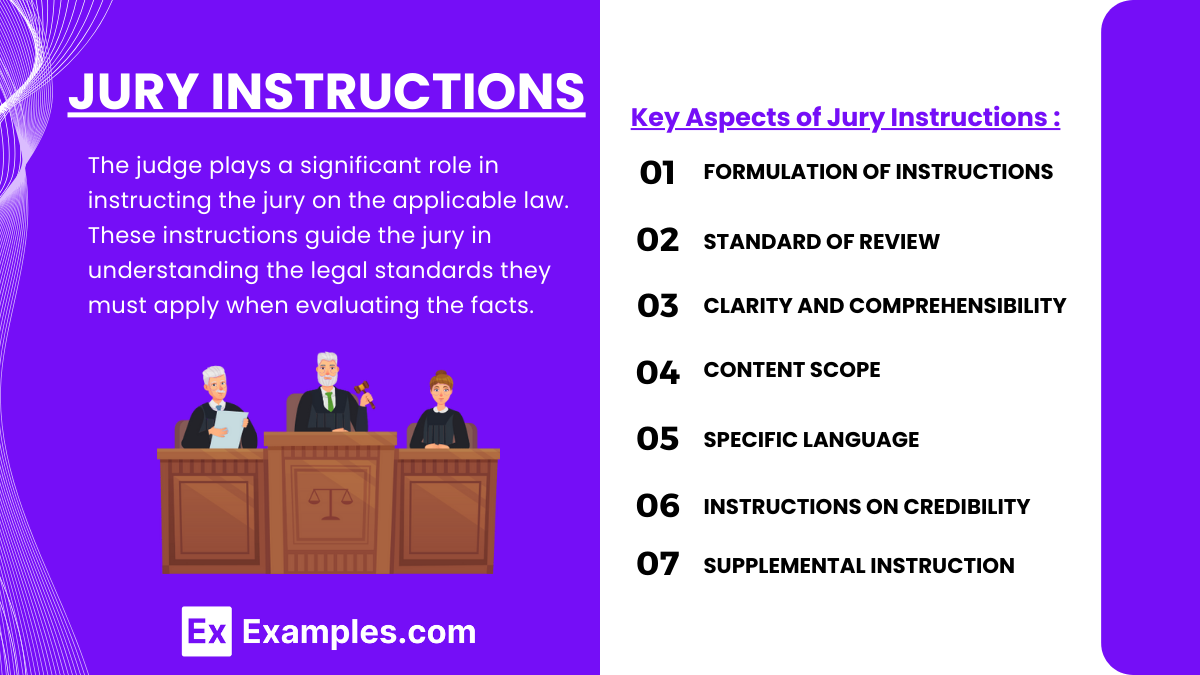
The judge plays a significant role in instructing the jury on the applicable law. These instructions guide the jury in understanding the legal standards they must apply when evaluating the facts.
Key Aspects of Jury Instructions:
- Formulation of Instructions: Both parties typically submit proposed jury instructions, and the judge determines which instructions to give. Instructions must accurately reflect the law relevant to the case.
- Standard of Review: On appeal, improper jury instructions are reviewed for “abuse of discretion” or “plain error” if they misstate the law or mislead the jury.
- Clarity and Comprehensibility: Jury instructions must be clear, unambiguous, and written in a way that is easily understandable to laypersons without legal training.
- Content Scope: Instructions should cover all elements of each claim and defense, explaining the burden of proof and any standards of liability or negligence.
- Supplemental Instructions: Additional instructions provided if the jury requests clarification.
- Specific Language: Avoids prejudicial language to ensure fairness.
- Instructions on Credibility: Helps jurors evaluate witness reliability, bias, and consistency.
Examples
Example 1: Legal vs. Equitable Claims
Imagine a plaintiff sues for both damages (a legal claim) and an injunction (an equitable claim). The plaintiff demands a jury trial for the entire case. The court must decide if the plaintiff is entitled to a jury trial for the damages portion, but not for the injunction claim. This distinction tests understanding of the Seventh Amendment right to a jury trial, which applies to legal but not equitable claims.
Example 2: Timely Jury Demand
In a contract dispute, the defendant realizes after filing an answer that they want a jury trial. However, they missed the 14-day deadline after serving their last pleading. The court will assess whether the defendant waived the right to a jury trial by not making a timely demand. This scenario examines procedural rules regarding the timing of jury trial requests under Federal Rule of Civil Procedure 38.
Example 3: Jury Selection and Voir Dire Challenges
During voir dire, one of the prospective jurors reveals a personal relationship with the plaintiff. The defendant moves to strike this juror for cause, arguing bias. Additionally, the defendant uses peremptory challenges to remove jurors they feel may be unfavorable. This example explores the voir dire process, types of challenges available, and the standards for challenging potential jurors for cause and via peremptory challenges.
Example 4: Judge’s Jury Instructions
In a negligence case, the judge provides the jury with instructions that fail to correctly explain the standard of care the defendant owed. The defendant objects, claiming the instructions could mislead the jury into applying the wrong standard. This example focuses on the importance of accurate jury instructions and highlights how improper instructions can be grounds for appeal if they result in an unfair verdict.
Example 5: General vs. Special Verdicts
In a defamation lawsuit, the jury is asked to decide if the defendant defamed the plaintiff and, if so, to award damages. The court can allow a general verdict (simply finding for one party) or a special verdict with detailed factual findings. If the jury renders a general verdict with inconsistent responses on special questions, the judge may need to reconcile or potentially order a new trial. This example addresses the differences between general and special verdicts and how inconsistencies can impact case outcomes.
Practice Questions
Question 1
Under the Federal Rules of Civil Procedure, which of the following statements is true regarding the right to a jury trial in civil cases?
A) A jury trial is available in both legal and equitable claims without distinction.
B) The right to a jury trial is guaranteed for all civil claims, regardless of type or amount in controversy.
C) A jury trial is generally only available for legal claims, not equitable claims.
D) A party may demand a jury trial for equitable claims if they do so within 14 days of the last pleading.
Answer: C) A jury trial is generally only available for legal claims, not equitable claims.
Explanation: Under the Seventh Amendment, the right to a jury trial in civil cases typically applies to legal claims, which historically involved monetary damages. Equitable claims, such as those seeking injunctions or specific performance, are usually tried by a judge alone. Federal Rule of Civil Procedure 38(b) provides that a party must demand a jury trial within 14 days after serving the last pleading directed to the issue to be tried. Option C is correct because it accurately states that a jury trial is generally available for legal claims and not for equitable claims.
- Option A is incorrect because the right to a jury trial does not apply equally to both legal and equitable claims.
- Option B is incorrect as the right to a jury trial is not guaranteed for all civil claims, only those deemed “at common law” with legal remedies.
- Option D is incorrect because equitable claims do not qualify for jury trials, even if demanded within the deadline.
Question 2
If a party in a federal civil case fails to request a jury trial within the deadline specified by the Federal Rules of Civil Procedure, what is the likely outcome?
A) The party has waived the right to a jury trial.
B) The court may still grant a jury trial if requested at any time.
C) The party may automatically receive a jury trial if the judge decides it is necessary.
D) The court must hold a jury trial if the opposing party consents, regardless of the waiver.
Answer: A) The party has waived the right to a jury trial.
Explanation: Federal Rule of Civil Procedure 38(b) requires that a demand for a jury trial be made in writing within 14 days after the service of the last pleading directed to the issue on which a jury trial is requested. If this deadline is missed, Rule 38(d) states that the right to a jury trial is waived. Courts do not grant jury trials on waived rights unless exceptional circumstances justify a late demand, which is rare.
- Option B is incorrect because, generally, courts do not allow jury trials once the right has been waived by missing the deadline.
- Option C is incorrect since a judge cannot unilaterally decide to give a jury trial if it has been waived.
- Option D is incorrect because even if the opposing party consents, waiver rules typically prevent the case from proceeding with a jury trial.
Question 3
A plaintiff files a complaint in federal court, seeking both monetary damages and an injunction. The plaintiff demands a jury trial. Which of the following correctly describes the trial procedure?
A) The entire case will be tried by a jury.
B) Only the claims for monetary damages will be tried by a jury, while the injunction claim will be decided by the judge.
C) The judge will decide whether the entire case can be heard by a jury.
D) The jury will decide the injunction claim, while the judge will decide the monetary damages claim.
Answer: B) Only the claims for monetary damages will be tried by a jury, while the injunction claim will be decided by the judge.
Explanation: In federal court, when a case involves both legal and equitable claims, the legal claims (seeking monetary damages) are generally tried by a jury, while equitable claims (such as those seeking an injunction) are decided by the judge. This aligns with the traditional distinction under the Seventh Amendment, where legal claims invoke the right to a jury trial, while equitable claims do not. Therefore, the correct procedure is for the judge to handle the injunction claim and for the jury to decide on the monetary damages.
- Option A is incorrect because the entire case is not eligible for a jury trial; only the legal (monetary damages) claims are.
- Option C is incorrect because the judge does not have discretion to override the right to a jury trial for legal claims.
- Option D is incorrect because the jury cannot decide on equitable claims, which are reserved for the judge’s decision.

